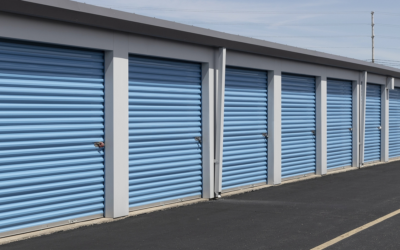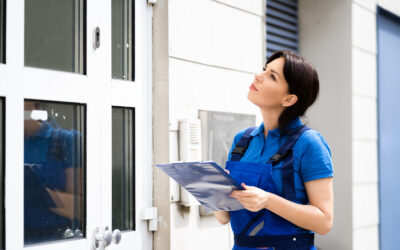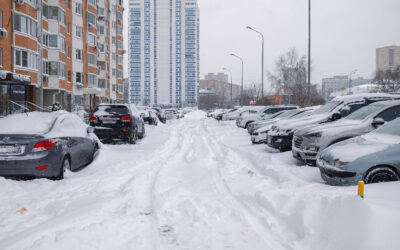Fires in commercial buildings can happen any time of year, but the risk can rise in winter. The colder months often bring increased usage of heating systems and electrical appliances as businesses work to make spaces more comfortable for employees and customers and to keep equipment and other business assets safe and operational. Winter weather also tends to be lower in humidity, and the dry air creates the perfect conditions for a small spark to turn into a significant hazard.
As we enter the new year, most of us are eager to tackle new goals and make the most of the year ahead. While most commercial property owners are very aware of fire risks, the importance of fire-safety inspections during winter months may not have made it to the top of your clients’ list of New Year’s resolutions. No matter what type of property your clients own or operate — a self-storage facility, residential property, office building, farm, or some other business — here are some tips you can share to help them prevent cold-weather fires, avoid costly property damage, and ensure the safety of their employees and customers during the winter season.
MiniCo’s Top Winter Fire Prevention and Safety Tips
As a retail insurance agent or broker, you can help your clients take proactive steps to guard against the threat of fire this winter. Some of these tips are relevant no matter the weather or season, but they’re particularly important when temperatures drop.
- Conduct a comprehensive fire-risk assessment. Regular inspections can proactively address issues and reduce the risk of fire incidents. If your clients haven’t done so already, it’s a good time to conduct a thorough fire-risk assessment of their buildings and surrounding grounds and structures. Identify and promptly resolve potential fire hazards, such as faulty wiring, outdated electrical systems, and overloaded circuits.
- Test fire alert and suppression systems. While prevention is ideal, it’s also important for businesses to make sure all their smoke alarms, sprinklers, fire extinguishers, and other fire defense systems are up to date, functional, and ready for use at a moment’s notice. In winter weather, it’s especially important to make sure sprinkler systems have sufficient heat to prevent freezing. Often, fire-sprinkler-system control rooms are located on exterior walls, which may be colder than other parts of a building and prone to freezing. The last thing a business needs is a frozen or burst pipe preventing the flow of water from the sprinkler system to a fire.
- Implement proper electrical maintenance. Faulty electrical systems are a leading cause of commercial fires. Make sure your clients are keeping up with routine inspections from a qualified electrician who can identify and proactively address potential issues. Ensure that all electrical work is up to code, and repair or replace any appliances or systems that are not in good working condition. During winter, employees may be tempted to bring in personal space heaters for warmth. While this may seem like a good option (especially in open-plan offices and drafty buildings), it’s best to instruct staff to avoid them. Too many heaters or heaters plugged into extension strips can overload electrical systems and increase fire risks.
- Educate staff on fire safety. Businesses should empower their staff with the knowledge and skills to prevent fires and respond effectively in case of an emergency. Regular fire-safety training sessions should cover topics such as evacuation procedures, the proper use of fire extinguishers, how to minimize risks, and the importance of promptly reporting potential hazards.
- Develop a winter-weather maintenance plan. Your clients may not consider snow and ice accumulation to be a fire hazard, but they actually are. Neglecting to properly remove excessive snow from a building’s roof can lead to a collapse, and while a damaged or destroyed roof is bad enough on its own, it can lead to an even bigger problem. Electrical conduits and gas lines are both sometimes run up through a building’s ceiling. If the collapse damages the gas and electrical lines, a fire can ignite and quickly spread throughout the building. Businesses should ensure they have a proper winter maintenance plan in place to clear snow accumulation from buildings and the surrounding premises. In addition to avoiding snow build-up on the roof, it’s important to clear pathways and emergency exits as well as ensure fire hydrants are accessible.
- Monitor heating systems. Heating systems are essential during the winter, but they can become a fire hazard if not properly maintained. By scheduling routine inspections for furnaces, boilers, and other heating appliances, your clients can ensure that all heating equipment is installed correctly, has adequate ventilation, and is in good working order.
- Reinforce smoke-break guidelines. Freezing temps and windy weather may seem like good reasons to stand closer to buildings during smoke breaks. Many states, however, have laws requiring smokers to maintain a minimum distance away from building entrances — and for good reason. In addition to the health hazards it creates for passersby, smoking near buildings increases the risk of property fires. In extremely cold weather, when it’s tempting to huddle up closer to the building, businesses may need to remind employees and customers that they still need to stick to designated smoking areas, as well as properly extinguish and dispose of cigarette butts.
- Store flammable materials safely away from heat sources. If your clients use or store flammable materials – chemicals, fuel, fertilizer, etc. – it’s essential that they take extra precautions during the winter. Businesses must take great care to always store these materials in designated areas away from heating sources and ensure that storage containers are sealed properly. When temps are icy and employees are eager to escape the chill, it can be easy to let best practices slip. But in cold weather, it’s just as important, if not more so, to maintain strict guidelines for handling and disposing of flammable materials.
- Pack up any remaining holiday decor. Most businesses have probably pulled down their holiday decor by now, but there may still be a few lingering strings of twinkle lights or Christmas trees and wreaths. Damaged cords from well-loved decorations that have been used year after year can present fire risks, and any leftover garland or greenery (real or artificial) serves as excellent kindling. While your clients are packing up holiday items, it’s a good time to inspect each piece for damaged or frayed cords and toss those items that have become hazardous.
MiniCo: Your Insurance Expert in 2024
Fire prevention throughout the winter months is an essential part of any commercial property’s risk-management program. By conducting regular assessments, implementing preventive measures, and educating staff, property owners and managers can create a secure environment for customers, employees, and businesses.
Looking for more guidance and support for your commercial property insurance clients in 2024? MiniCo has 19 exclusive programs and offers specialized insurance solutions for self-storage facilities, nonprofit and social services organizations, commercial farm and ranch operations, adult residential facilities, and more. Contact a MiniCo program expert for coverage details and risk management information and to learn how you can help protect your clients this year.




